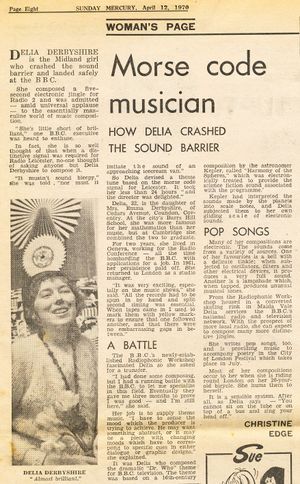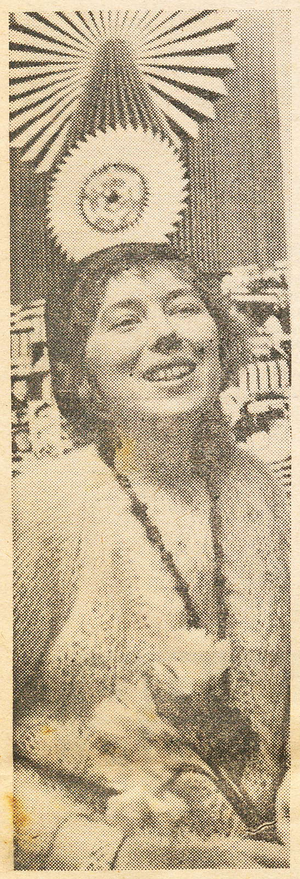Morse code musician
On 12th April 1970 the following article appeared in the Sunday Mercury newspaper.
According to its author, Cristine Edge, "part of the article was rewritten by subs and a muck-up made".[1]
Transcript
Morse code musician
How Delia crashed the sound barrier
DELIA DERBYSHIRE is the Midland girl who crashed the sound barrier and landed safely at the B B C.
She composed a five-second electronic jingle for Radio 2 and was admitted -- amid universal applause -- to the essentially masculine world of music composition.
“She's little short of brilliant,” one B.B.C. executive was heard to enthuse.
In fact, she is so well thought of that when a distinctive signal was required for Radio Leicester, no-one thought of asking anyone but Delia Derbyshire to compose it.
“It mustn't sound bleepy,” she was told, “nor must it imitate the sound of an approaching icecream van.”
So Delia devised a theme tune based on the morse code signal for Leicester. It took her less than 24 hours “and the director was delighted.”
Delia, 32, is the daughter of Mrs. Emma Derbyshire, of Cedars Avenue, Coundon, Coventry. At the city's Barrs Hill School, she was more famous for her mathematics than her music, but at Cambridge she combined the two to graduate.
For two years, she lived in Geneva, working for the Radio Conference -- all the time bombarding the B.B.C. with applications for a job. In 1961, her persistence paid off. She returned to London as a studio manager.
“It was very exciting, especially on the music shows,” she said. “All the records had to be spun in by hand and split second timing was essential. When tapes came in I used to mark them with yellow markers to ensure that one followed another, and that there were no embarrassing gaps in between,”
A BATTLE
The B.B.C.'s newly-established Radiophonic Workshop fascinated Delia so she asked for a transfer.
“I had done some composing but I had a running battle with the B.B.C. to let me specialise in this field. Eventually they gave me three months to prove I was good -- and I'm still here,” she said.
Her job is to supply theme music. “I have to sense the mood which the producer is trying to achieve. He may want something abstract, or it may be a piece with changing moods which have to correspond to specific cues in either dialogue or graphic designs,” she explained.
It was Delia who composed the dramatic “Dr. Who” theme for B.B.C. television. The theme was based on a 16th-century composition by the astronomer Kepler, called “Harmony of the Spheres,” which was electronically treated to provide the science fiction sound associated with the programme.
Kepler had interpreted the sounds made by the planets into scale notes, and Delia subjected them to her own gliding scale of electronic sounds.
POP SONGS
Many of her compositions are electronic. The sounds come from a variety of sources. One of her favourites is a bell with a delicate tinkle; when subjected to oscillators, filters and other electrical devices, it produces a very full sound. Another is a lampshade which, when tapped, produces unusual musical tones.
Fron the Radiophonic Workshop housed in a converted skating rink in Maida Vale Delia services the B.B.C.'s national radio and television network. With the prospect of more local radio, she can expect to compose many more distinctive jingles.
She writes pop songs too, and is providing music to accompany poetry in the City of London Festival which takes place in July.
Most of her compositions occur to her when she is riding round London on her 20-year-old bicycle. She hums them to herself.
It is a sensible system. After all, as Delia says -- “You cannot sit on the tube or on top of a bus and sing your head off.”
CHRISTINE EDGE

